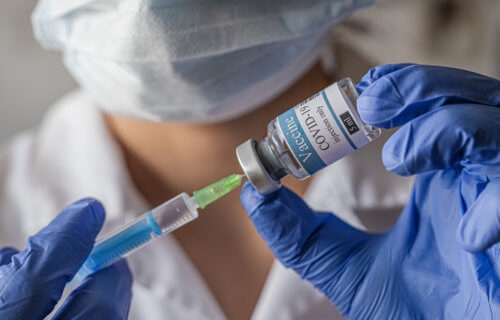BOSTON — Citizens around the globe are placing their collective hopes on the speedy development of an effective coronavirus vaccine. Luckily, a team of scientists at the Beth Israel Deaconess Medical Center have some good news in that department.
The vaccine they’ve been working on, a leading COVID-19 vaccine candidate, successfully raised neutralizing antibodies in a group of non-human primates after a single shot.
“This vaccine led to robust protection against SARS-CoV-2 in rhesus macaques and is now being evaluated in humans,” says study leader & immunologist Dr. Dan H. Barouch, Director of BIDMC’s Center for Virology and Vaccine Research, in a release.
What makes this vaccine candidate so effective? It uses a common cold virus called adenovirus serotype 26 (Ad26) to transport the SARS-CoV-2 spike protein into host cells. When this occurs, the body reacts by activating the immune system against the coronavirus.
COVID-19 vaccine response among primates
Dr. Barouch and his team have been working on this vaccine ever since Chinese scientists originally released the SARS-CoV-2 genome back in January. Since then the research team, in collaboration with Johnson & Johnson, has designed a number of different vaccine candidates. Each version expresses different variations of the SARS-CoV-2 spike protein (the main target for antibodies).
CLICK HERE TO SUBSCRIBE TO OUR NEWSLETTER & GET THE LATEST STUDIES FROM STUDYFINDS.ORG BY EMAIL!
A total of 52 non-human primates were involved in the trial; 32 adult rhesus macaques were given a single dose of one of seven different variations of the Ad26-based vaccine, while 20 other primates were administered a placebo vaccine. All primates that were given a legitimate vaccine developed neutralizing antibodies.
Roughly six weeks later all of those primates were exposed to SARS-CoV-2.
Predictably, all 20 of the primates given the placebo developed an infection and had high levels of the coronavirus in their lungs and noses. But, the six primates given the most refined version of the real vaccine candidate, Ad26.COV2.S, showed no signs of the coronavirus in their lungs at all. One primate in this group did show low levels of the coronavirus in their nasal swabs.
Also, researchers say that the development of neutralizing antibodies correlates with coronavirus protection. This is noteworthy because it suggests antibody responses are capable of measuring COVID-19 vaccines’ effectiveness among humans as well.
Human testing on deck
“Our data show that a single immunization with Ad26.COV2.S robustly protected rhesus macaques against SARS-CoV-2 challenge,” Dr. Barouch adds. “A single-shot immunization has practical and logistical advantages over a two-shot regimen for global deployment and pandemic control, but a two-shot vaccine will likely be more immunogenic, and thus both regimens are being evaluated in clinical trials. We look forward to the results of the clinical trials that will determine the safety and immunogenicity, and ultimately the efficacy, of the Ad26.COV2.S vaccine in humans.”
The team at BIDMC is already moving forward on a human trial for the vaccine candidate.
The study is published in Nature.
Like studies? Follow us on Facebook!
